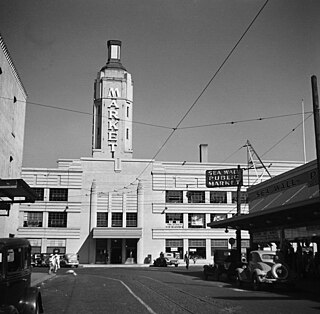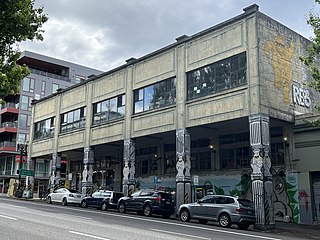
Old Town Chinatown is the official Chinatown of the northwest section of Portland, Oregon. The Willamette River forms its eastern boundary, separating it from the Lloyd District and the Kerns and Buckman neighborhoods. It includes the Portland Skidmore/Old Town Historic District and the Portland New Chinatown/Japantown Historic District, which are listed on the National Register of Historic Places. It has been referred to as the "skid row" of Portland.

The Burnside Triangle, also known as Pink Triangle or Vaseline Alley, was a triangular district in Portland, Oregon, United States, known for its relatively higher density of LGBT and gay-friendly businesses.

East Portland was a city in the U.S. state of Oregon that was consolidated into Portland in 1891. In modern usage, the term generally refers to the portion of present-day Portland that lies east of 82nd Avenue, most of which the City of Portland annexed in the 1980s and 1990s.

The Portland Public Market was a public market in Portland, Oregon, United States, built in 1933 at a widely advertised cost of $1 million. Controversial and ambitious, it was intended to replace the Carroll Public Market, centered at southwest Fifth and Yamhill Streets; the Portland Public Market was never popular and was in financial trouble virtually from the day it opened.
The X-Ray Cafe was a small music venue in Portland, Oregon, United States from 1990 to 1994. An all-ages and community-oriented club, the X-Ray played a "heavyweight role in shaping Portland's underground culture", fostering such musical acts as The Dandy Warhols, Dead Moon, Elliott Smith, Team Dresch, and Quasi, and hosted national acts like Bikini Kill and Green Day and was described by Details as one of the best rock and roll clubs in the country. Located at 214 W. Burnside St., it was characterized by a surreal environment and performers; owners Tres Shannon and Benjamin Arthur Ellis, who took over the U.F.O Cafe to establish the X-Ray and were in the band The Kurtz Project, encouraged acts that featured instruments that aren't typically associated with rock music, like Big Daddy Meatstraw, who performed on stage in clown costumes. As grunge and alternative music were emerging in Portland and Seattle under a national spotlight, the X-Ray served as an important stage for smaller acts in the genre, and along with nearby Satyricon nightclub, established Portland as an important regional performing destination for touring bands.
NW Natural, formerly Northwest Natural Gas Company, is an American publicly traded utility headquartered in Portland, Oregon, United States. Primarily a natural gas distributor, the company services residential, commercial, and industrial customers in Western Oregon and Southwest Washington in the Pacific Northwest. NW Natural also owns water utilities. Founded in 1859, the company has approximately 680,000 customers and revenues of nearly one billion in US dollars annually.

Oak Knoll Winery is a privately held winery located in the Tualatin Valley near Hillsboro, Oregon, United States. Established in 1970, it is the oldest winery in Washington County, and produces Pinot noir, Pinot gris, and Chardonnay. The winery also known for producing Frambosia, a red raspberry wine.

Canyon Road is a 6.5 mi (10.5 km) major road and partial state highway, which serves as a connector between Beaverton and Portland, Oregon, United States. It was the first major road constructed between the Tualatin Valley and Portland, and has contributed significantly to Portland becoming the area's major deep water port, and subsequent early growth of the city. The total modern length is 6.5 miles (10.5 km), and 2.7 miles (4.3 km) of the route is coterminous with U.S. Route 26. In addition, the segment of the road signed as Oregon Route 8 under the name Canyon Road spans for 3.8 miles (6.1 km). There is an additional, small portion of a driveway in the Oregon Zoo parking lot that is also named Canyon Road; this is a continuation of a local suburban street named Canyon Court.

Gazelle was an early sidewheeler on the Willamette River in what is now the U.S. state of Oregon. She did not operate long, suffering a catastrophic boiler explosion on April 8, 1854, less than a month after her trial voyage. This was the worst such explosion ever to occur in the Pacific Northwest states. The wrecked Gazelle was rebuilt and operated for a few years, first briefly as the unpowered barge Sarah Hoyt and then, with boilers installed, as the steamer Señorita. A victim of the explosion was D.P. Fuller, age 28, who is buried in Lone Fir Cemetery in Portland, Oregon.

Mary's Club is the oldest strip club in Portland, Oregon, and among the oldest in the United States. In 1954, Roy Keller bought the business from Mary Duerst Hemming, who owned and operated Mary's as a piano bar beginning in the 1930s. Keller initially hired go-go dancers as entertainment during the piano player's breaks, later hiring them full-time because of their popularity. Topless dancers wearing pasties were introduced in 1955. The club also featured comics, musicians, singers and other acts. All-nude dancing began in 1985, after a judicial ruling against City of Portland ordinances banning it in venues which served alcohol.
There are several well-known and commonly used nicknames referring to Portland, Oregon.
The James Beard Public Market is a proposed public market in Portland, Oregon. It is named after James Beard, a Portland-born chef and cookbook writer. The market was planned to be located at the west end of the Morrison Bridge in downtown Portland, in what are currently parking lots, but this site was dropped in November 2016 after concerns over pedestrian accessibility due to the bridgehead ramps. The developer, Melvin Mark Development, still plans to build a 17-story building at the same site. Original designs for the market called for it to have two halls, totaling 80,000 square feet (7,400 m2), along with 60 permanent and 30 to 40 temporary stalls for food vendors. Design for the market is being led by the Norwegian architectural firm Snøhetta.

Hobo's Restaurant and Lounge, or simply Hobo's, was a restaurant, gay bar, and piano bar in Portland, Oregon's Old Town Chinatown, in the United States. Housed in a building with rare access to the Shanghai tunnels, the establishment served as a starting point for guided tours. The menu consisted of American cuisine including steakhouse fare. Hobo's was featured on the Food Network's Rachael Ray's Tasty Travels and the Travel Channel's Ghost Adventures, before closing during the COVID-19 pandemic.

Third Eye Shoppe, commonly known as The Third Eye, was a head shop in Portland, Oregon's Hawthorne district and Richmond neighborhood, in the United States. The shop was founded in 1987 and owned by cannabis and counterculture activist Jack Herer. His son, Mark Herer, took over as the shop's owner in 2001. The Third Eye closed on March 31, 2017, as a result of declining sales, development of the surrounding neighborhood, increasing health care costs, and increased competition. For nearly thirty years, the shop was associated with Portland's cannabis culture and recreational drug tourism, and was included in Willamette Week's annual "Best of Portland" reader's poll several times.

City Liquidators is a furniture warehouse in Portland, Oregon's Buckman neighborhood, in the United States. The company was established by Walt Pelett in 1977; he and his wife, Pam Pelett, still own the company as of 2015. The company occupies seven buildings totaling 390,000-square feet, as of early 2015.
The Willamette Escarpment is an escarpment that runs along the east bank of the Willamette River in Portland, Oregon, United States. The escarpment comprises two distinct sections: a 200-acre (81 ha) North Escarpment Unit, which extends from the Fremont Bridge northwest to the St. Johns Bridge, and a 75-acre (30 ha) South Escarpment Unit, which extends from the Sellwood Bridge north to the Ross Island Bridge.
Portland Museum of Modern Art (PMOMA) in Portland, Oregon, was founded in 2012. It was located in the basement of Mississippi Records and was founded by curator Libby Werbel. The Museum was staffed by Mississippi Records employees.

Cafe Nell is a restaurant in Portland, Oregon's Northwest District, United States. The restaurant is owned by Vanessa Preston.

Shanghai Tunnel Bar, or simply Shanghai Tunnel, is a dive bar and Asian restaurant in the Old Town Chinatown neighborhood of Portland, Oregon. Named after the city's Shanghai tunnels, the underground bar serves Asian-themed cocktails and foods such as BLTs, Chinese chicken salad, miso and noodle soup, quesadillas, and veggie burgers. Owned by Phil Ragaway, Shanghai Tunnel is known for its inexpensive drinks and pinball machines. The bar closed temporarily during the COVID-19 pandemic, and later offered street-level service.

Hippo Hardware and Trading Company, or simply Hippo Hardware, is a hardware store in Portland, Oregon. Established by Steven Miller and Stephen Oppenheim in southeast Portland in 1976, the business has operated from its current location on East Burnside Street in the Buckman neighborhood since 1990. Hippo Hardware sells new and salvaged hardware, lighting, plumbing and other materials, as has a hippopotamus theme throughout. The store has supplied locally filmed television series and has been described as an institution and a landmark.















